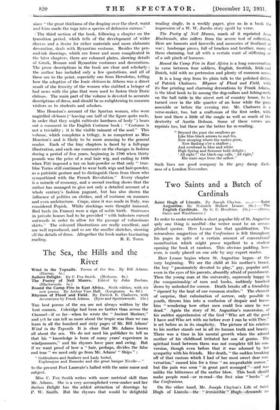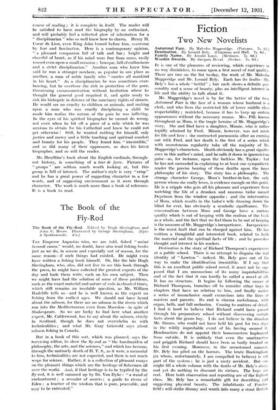Two Saints and a Batch of Cardinals IN order to
make readable a short popular life of St. Augustine qnly one thing is needful—the writer must be an accom- plished quoter. Herr Lesaar has that qualification. The miraculous magnetism- of the Confessions is felt throughout his pages in spite of a certain amount of conventional moralization which might prove repellent to a student opening the book at random. This obvious padding, how- ever, is easily placed on one side by any expert reader.
Herr Lesaar begins where St. Augustine began—at the very beginning. We see the child at his mother's breast, the boy " passionately devoted to play," gay, popular and, even in the eyes of his parents, absurdly afraid of punishment. Then the young man at the university, supremely happy in
the companionship' of men and books, suddenly knocked down by unlooked-for sorrow. Death breaks off a friendship
" ripened by the 'heat of our common studies." The element of surprise, that culmination of sorrow, only possible in . youth, throws him into 9; confusion of despair and leaves him " wonelering how other men could live since he was dead." , Again the story of St. Augustine's conversion, of his sudden apprehension of the God "Who art all the good I have and Who art with me before ever I can be with Thee." is set before us in its simplicity. The picture of his relation to his mother stands out in all its human truth and beauty. There was a' time in his mental growth when the adored mother of his childhood irritated her son of genius. - The spiritual bond between them was not complete till his con- version, though even before that it was adorned by her sympathy with his friends. Her death, " the sudden breaking off of that custom which I had of her most sweet dear con- versation," caused him for a time " an unspeakable sorrow," but the pain was soon " in great part assuaged "—and was unlike the bitterness of the earlier blow. This book should make people read—or re-read—the first nine " b6oks of the Confessions.
On the other hand, Mr. Joseph Clayton's Life of Saint Hugh of Lincoln=the " irresistible " 110gh-demands 11,, course of reading ; it is complete in itself. The reader will be satisfied to have read the biography by an enthusiast, and will probably feel a reflected glow of admiration for a " disciplinarian " who so well knew how to charm. Henry II, Coeur de Lion, even King John bowed before him, overcome by fear and fascination. Here is a contemporary opinion, " a pleasant companion full of talk and fun ; bright and cheerful of heart, as if his mind were free from cares, easily roused even upon a small occasion ; brusque; full of enthusiasin and a strict disciplinarian." Another man who knew him said he was a stranger nowhere, as popular in one place as another, a man of noble family who " carries all mankind in his heart." As a disciplinarian he was sometimes over- bearing, but he overbore the rich in protection of the poor, threatening excommunication without hesitation where he thought the general good required it, and quite ready to risk his bishopric in defence of the sanctuary rights of sinners. He would see no cruelty to children or animals, and rushing upon a man who was cruelly disciplining a child he made him realize the nature of the pain he was inflicting. In the eyes of his spirited biographer he cannot do wrong, not even when he bit off a piece of a relic which he was anxious to obtain for his Cathedral and knew he could not get otherwise Still, he wanted nothing for himself, only justice and mercy and a little teaching and spiritual comfort and beauty for his people. They found him " irresistible," and so did many of their oppressors, so does his latest biographer, and so will the reader.
Mr. Heseltine's book about the English cardinals, through- out history, is something of a tour de force. Pictures of " groups " are seldom much worth looking at, but this group is full of interest. The author's style is very " crisp" and he has a great power of suggesting character in a few words, and of suggesting environment as it were through character. The work is much more than a book of reference. It is a book to .read.











































 Previous page
Previous page